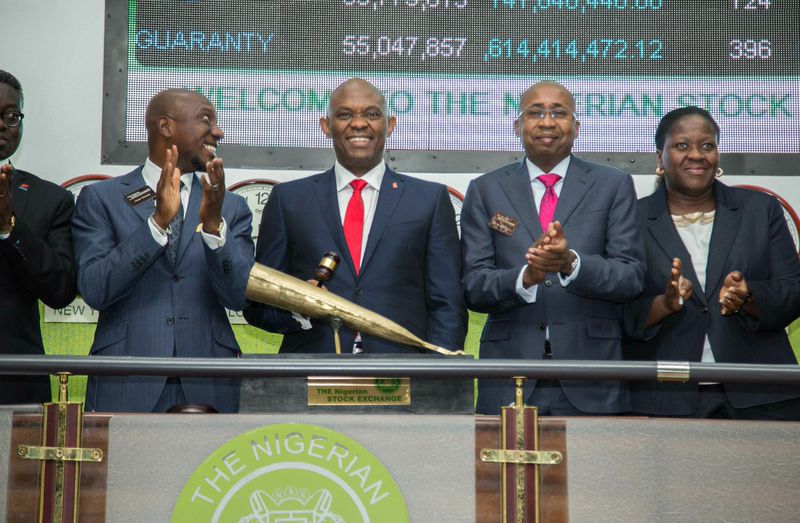- ‘Offshore Trade Boosted Nigerian Shares in June’
Transactions on the country’s stock market rose by 7.13 per cent to N220.27bn ($699.3m) in June from a month earlier, lifted by increased flows from foreign investors, stock exchange data showed on Thursday.
The value of foreign transactions on the local bourse rose by 6.66 per cent to N101.53bn in the period, according to the data.
Nigerian assets, largely shunned by foreign investors over the past three years, are back on their radar thanks to a drop in valuations and improved liquidity.
The equity market has benefited from the introduction more than four months ago of a new window for investors to trade the naira at market-determined exchange rates.
The report showed that foreign investors’ transactions on the local bourse rose by 59.81 per cent to N430.23bn in the first half of this year, compared with N269.22bn a year earlier.
Last week, the market had rallied for eight consecutive weeks and peaked at a 33-month high before profit-takers took advantage of the gains to sell their holdings.
The market’s main index has gained about 34 per cent year-to-date but profit-taking has dominated trading since the start of the week.
“What we have seen is locals riding on the back of foreign investors in the market,” Kemi Akinde, an analyst at Meristem Securities, told Reuters last week.
The gains have extended beyong June, and as of July 14 this year, the Nigerian equities market had attracted N2.715tn investments owing to the foreign exchange window for investors and exporters introduced by the Central Bank of Nigeria on April 21 this year.
Stocks saw huge rallies across board evident in the soaring Nigerian Stock Exchange market capitalisation of listed equities, the All-Share Index, number of deals, as well volumes traded vis-a-vis their values.
The NSE market capitalisation has appreciated by 31.04 per cent between April 20 (last trading day before the window’s opening) and July 14 (latest trading day), from N8.748tn to N11.463tn.
In the same vein, the All-Share Index, volumes traded, deals and value of transactions as of April 20 were 25,282.75 basis points, 147.887 million, 2,578 and N836.842m, respectively.
as of July 14, the respective figures had risen to 33,261.66 basis points, 311.608 million, 3,113 and N3.27bn.
The special forex window tagged, ‘Investors and Exporters FX Window’, according to the apex bank, will boost liquidity in the forex market and ensure timely execution and settlement of eligible transactions.
Small-scale investors and exporters have always decried the closure of several outfits due to lack of access to foreign exchange to procure necessary facilities to support their operations.
The central bank had earlier opened a special window for the Small and Medium Enterprises to facilitate the importation of eligible finished and semi-finished items.
However, the eligible transactions covered under the new window include invisible transactions, such as loan repayments, loan interest payments, dividends/income remittances, capital repatriation, management service fees and consultancy fees.
Also covered by the forex window are software subscription fees, technology transfer agreements, personal home remittances, bills for collection and any other trade-related payment obligations at the instance of the customer.
Other eligible transactions like ‘miscellaneous payments’ detailed under Memorandum 15 of the CBN foreign exchange manual, are also covered under the new window.
Also, transactions and bills for collection are eligible to purchase foreign currencies sourced from the CBN forex window limited to secondary market intervention sales, wholesale (spot and forwards) only.
The only items excluded under the new window are international airlines ticket sales’ remittances, which will only be eligible to access forex at the CBN FX window.
For the apex bank, the supply of dollars to the new window shall be through portfolio investors, exporters, authorised dealers and other parties with foreign currencies to exchange to naira.


 Billionaire Watch3 weeks ago
Billionaire Watch3 weeks ago
 Startups4 weeks ago
Startups4 weeks ago
 News4 weeks ago
News4 weeks ago
 News4 weeks ago
News4 weeks ago
 Bitcoin4 weeks ago
Bitcoin4 weeks ago
 Naira4 weeks ago
Naira4 weeks ago
 Forex3 weeks ago
Forex3 weeks ago
 Treasury Bills4 weeks ago
Treasury Bills4 weeks ago
























